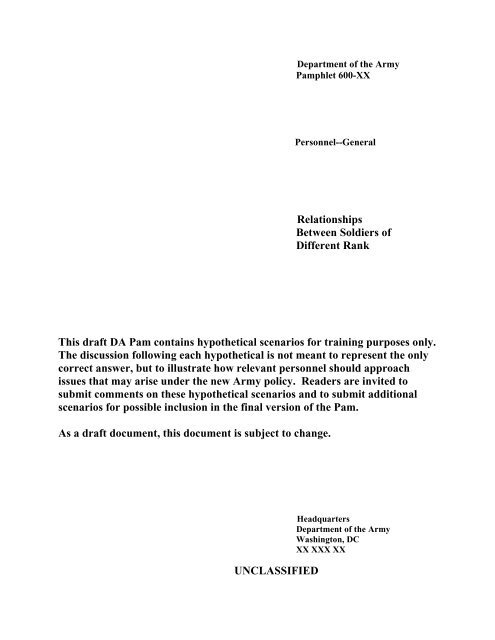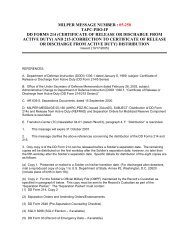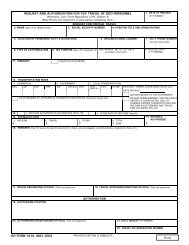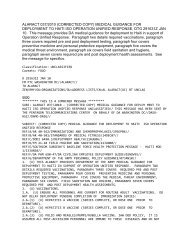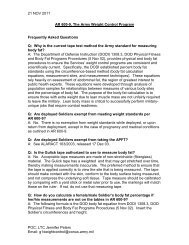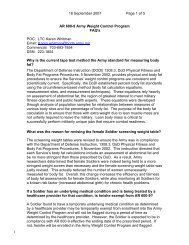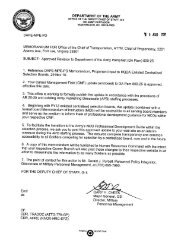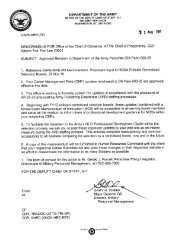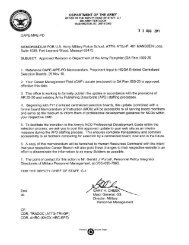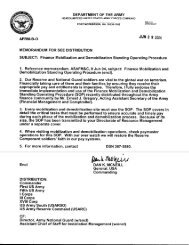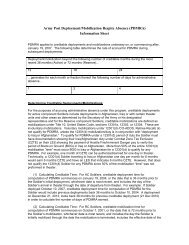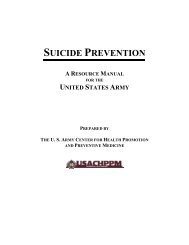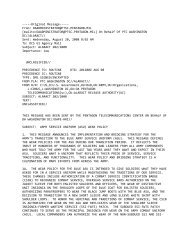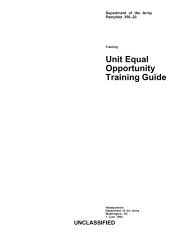Army Pamphlet 600-35 - Deputy Chief of Staff ARMY G-1 - U.S. Army
Army Pamphlet 600-35 - Deputy Chief of Staff ARMY G-1 - U.S. Army
Army Pamphlet 600-35 - Deputy Chief of Staff ARMY G-1 - U.S. Army
Create successful ePaper yourself
Turn your PDF publications into a flip-book with our unique Google optimized e-Paper software.
Department <strong>of</strong> the <strong>Army</strong><br />
<strong>Pamphlet</strong> <strong>600</strong>-XX<br />
Personnel--General<br />
Relationships<br />
Between Soldiers <strong>of</strong><br />
Different Rank<br />
This draft DA Pam contains hypothetical scenarios for training purposes only.<br />
The discussion following each hypothetical is not meant to represent the only<br />
correct answer, but to illustrate how relevant personnel should approach<br />
issues that may arise under the new <strong>Army</strong> policy. Readers are invited to<br />
submit comments on these hypothetical scenarios and to submit additional<br />
scenarios for possible inclusion in the final version <strong>of</strong> the Pam.<br />
As a draft document, this document is subject to change.<br />
UNCLASSIFIED<br />
Headquarters<br />
Department <strong>of</strong> the <strong>Army</strong><br />
Washington, DC<br />
XX XXX XX
SUMMARY <strong>of</strong> CHANGES<br />
PAM <strong>600</strong>-XX<br />
Relationships Between Soldiers <strong>of</strong> Different Rank<br />
This revision<br />
¤ Supplements AR <strong>600</strong>-20, <strong>Army</strong> Command Policy.<br />
¤ Provides examples <strong>of</strong> proper and improper relationships between soldiers <strong>of</strong> different rank.<br />
* Incorporates recent changes in <strong>Army</strong> policy relating to good order and discipline.
PREFACE<br />
Discipline is the soul <strong>of</strong> the <strong>Army</strong>. It makes small numbers formidable,<br />
procures success to the weak, and esteem to all.<br />
--George Washington<br />
Soldiers <strong>of</strong> all ranks meet and associate with each other in many settings, both on and <strong>of</strong>f duty. These meetings and<br />
associations foster the trust and confidence necessary for mission accomplishment. Soldiers associating with one<br />
another are governed in part by " rank " relationships, which are basic requirements for maintaining good order and<br />
discipline. How these relationships impact authority, discipline and morale is central to evaluating soldier<br />
relationships.<br />
Historically, a relationship between two soldiers having a detrimental effect on the authority <strong>of</strong> the senior has<br />
generally been regarded as "fraternization." The Manual for Courts-Martial (1995), part IV, paragraph 83, defines<br />
the criminal <strong>of</strong>fense <strong>of</strong> fraternization. These elements are required for the crime:<br />
--commissioned or warrant <strong>of</strong>ficer.<br />
--fraternization on terms <strong>of</strong> military equality with members known to be enlisted.<br />
--fraternization must violate a custom <strong>of</strong> the <strong>Army</strong>.<br />
--conduct must be prejudicial to good order and discipline or bring discredit on the armed forces.<br />
The crime has been extended by court decisions. Fraternization between senior and junior enlisted or between<br />
senior and junior <strong>of</strong>ficers, when in a senior-subordinate relationship, is also chargeable as a violation <strong>of</strong> Article 134<br />
<strong>of</strong> the Uniform Code <strong>of</strong> Military Justice when there is a violation <strong>of</strong> customs <strong>of</strong> the service and the conduct is<br />
prejudicial to good order and discipline or service discrediting.<br />
The criminal <strong>of</strong>fense <strong>of</strong> "fraternization" is different from a violation <strong>of</strong> the <strong>Army</strong>'s regulatory policy regarding<br />
relationships between soldiers <strong>of</strong> different rank. Any relationship which diminishes or predictably will diminish the<br />
ability <strong>of</strong> the senior member to influence a subordinate (junior) through the exercise <strong>of</strong> leadership or command is an<br />
unacceptable relationship in military service. Such relationships are rarely criminal, although they can be if they<br />
violate <strong>Army</strong> custom by either prejudicing good order and discipline or discrediting the service.<br />
Close, personal relationships are desirable and required to build cohesive units in the <strong>Army</strong>. Soldiers <strong>of</strong> all ranks<br />
must feel they belong to the "family." We want to build "the bond <strong>of</strong> all comrades" who can fight, win, and survive<br />
on the battlefield. Building the "family" requires caring for one another with a pr<strong>of</strong>essional sensitivity. Positive<br />
personal relationships are marks <strong>of</strong> good, solid interaction between soldiers <strong>of</strong> different rank. The <strong>Army</strong> needs<br />
pr<strong>of</strong>essional, caring interactions because they build vertical bonds which tie leaders and followers. The leader must<br />
be counted on to use good judgment, experience, and discretion to draw the line between relationships which are<br />
"destructive" and those which are "constructive."
Headquarters Department <strong>of</strong> the <strong>Army</strong><br />
Department <strong>of</strong> the <strong>Army</strong> <strong>Pamphlet</strong> <strong>600</strong>-XX<br />
Washington, DC<br />
XX XXX XX<br />
Relationships Between Soldiers <strong>of</strong> Different Rank<br />
History. This printing revises an existing pamphlet.<br />
Summary. This pamphlet provides guidance and<br />
examples about relationships between soldiers <strong>of</strong><br />
different rank in the United States <strong>Army</strong>. It<br />
implements the policy contained in AR <strong>600</strong>-20,<br />
paragraphs 4-14 through 4-16.<br />
Applicability. This pamphlet applies to the Active<br />
<strong>Army</strong>, members <strong>of</strong> the <strong>Army</strong> Reserve while on active<br />
duty and inactive duty for training, and members <strong>of</strong><br />
the <strong>Army</strong> National Guard <strong>of</strong> the United States only<br />
when in Federal Service (Section 802(a)(3), title 10,<br />
United States Code). Examples <strong>of</strong> Federal service<br />
are Active Guard/Reserve duty, Overseas<br />
Deployment Training, or training conducted out-<strong>of</strong>state.<br />
Procedures in this pamphlet are not modified<br />
during mobilization.<br />
Proponent and exceptions. The proponent <strong>of</strong> this<br />
pamphlet is the <strong>Deputy</strong> <strong>Chief</strong> <strong>of</strong> <strong>Staff</strong> for<br />
Personnel. The proponent has the authority to<br />
Contents<br />
Introduction<br />
Purpose<br />
References<br />
Explanation <strong>of</strong> abbreviations and terms<br />
Historical perspective<br />
Good judgment and problem situations<br />
Examples <strong>of</strong> proper and improper relationships<br />
General<br />
Commander - staff <strong>of</strong>ficer<br />
<strong>Staff</strong> <strong>of</strong>ficer - staff <strong>of</strong>ficer<br />
Noncommissioned <strong>of</strong>ficer - junior enlisted soldier<br />
Platoon sergeant - enlisted soldier<br />
Enlisted soldier - NCO supervisor<br />
Drill sergeant - IET trainees<br />
Officer - Trainee (Family Relationships)<br />
First Sergeant - enlisted soldier (<strong>Army</strong> Reserve and<br />
<strong>Army</strong> National Guard)<br />
Officer - enlisted soldier (Dating)<br />
Officer - enlisted (Social)<br />
Officer - enlisted (Community Activity)<br />
Personnel-General<br />
approve exceptions to this pamphlet that are<br />
consistent with controlling law and regulation.<br />
Proponents may delegate this authority, in writing, to<br />
a division chief under their supervision within the<br />
proponent agency who holds the grade <strong>of</strong> colonel or<br />
the civilian equivalent.<br />
Suggested improvements. The proponent agency <strong>of</strong><br />
this pamphlet is the Office <strong>of</strong> the <strong>Deputy</strong> <strong>Chief</strong> <strong>of</strong><br />
<strong>Staff</strong> for Personnel. Users are invited to send<br />
comments and suggested improvements on DA Form<br />
2028 (Recommended Changes to Publications and<br />
Blank Forms) directly to HQDA (DAPE-HR-L),<br />
WASH DC 20310-0300.<br />
Distribution. Distribution <strong>of</strong> this publication has<br />
been made in accordance with the requirements on<br />
DA Form 12-09-E, block number 5415, intended for<br />
command levels A through E for Active <strong>Army</strong>, <strong>Army</strong><br />
National Guard, and U.S. <strong>Army</strong><br />
Reserve.<br />
Officer - enlisted (Athletic Activities)<br />
<strong>Staff</strong> <strong>of</strong>ficer - enlisted soldier (Athletic Activity)<br />
Officer - enlisted (Religious)<br />
Battalion Commander - Sergeant Major (Unit<br />
Function)<br />
Officer - enlisted (Family Support Group)<br />
Officer - enlisted (Business)<br />
Officer - enlisted (Married, business)<br />
Officer - enlisted (Gambling)<br />
Officer - enlisted (Gambling)<br />
Officer - enlisted (Married - gambling)<br />
Officer - enlisted (<strong>Army</strong> Reserve and <strong>Army</strong><br />
National Guard)<br />
Officer - enlisted (Active Guard and Reserve)<br />
Officer - enlisted (Promotion into non-compliance)<br />
<strong>Staff</strong> <strong>of</strong>ficer - <strong>Army</strong> civilian<br />
Appendix References<br />
Glossary<br />
Index
Chapter 1<br />
Introduction<br />
1-1 Purpose<br />
This pamphlet explains the policy on soldier<br />
relationships contained in AR <strong>600</strong>-20, paragraphs 4-<br />
14 through 4-16. It provides examples to help<br />
soldiers, commanders, and <strong>Army</strong> civilians<br />
understand <strong>Army</strong> custom and regulation on<br />
relationships between members <strong>of</strong> different rank.<br />
1-2 References<br />
Required and related publications are listed in<br />
appendix A.<br />
1-3 Explanation <strong>of</strong> abbreviations and terms<br />
Abbreviations and special terms used in this<br />
pamphlet are explained in the glossary.<br />
1-4 Historical perspective<br />
a. Leaders always have judged soldier relationships<br />
with the assistance <strong>of</strong> the customs and traditions <strong>of</strong><br />
the Service. The military custom on fraternization<br />
forbade undue familiarity between <strong>of</strong>ficers and<br />
enlisted soldiers. It was said, "familiarity breeds<br />
contempt." While certain relationships--gambling<br />
with, drinking with, or borrowing money from<br />
enlisted soldiers--were specifically forbidden, most<br />
relationships were judged by the effects <strong>of</strong> the<br />
relationship. Custom protected the <strong>of</strong>ficer from<br />
situations where undue familiarity would undermine<br />
command authority and thereby threaten the good<br />
order, morale, or discipline <strong>of</strong> the unit. It also<br />
protected the enlisted soldier from unprincipled<br />
<strong>of</strong>ficers who might take advantage <strong>of</strong> rank and<br />
position. The custom regarding fraternization has<br />
always been primarily directed at <strong>of</strong>ficer-enlisted<br />
relationships.<br />
b. The custom against undue familiarity was based<br />
on class distinctions, as well as discipline, since<br />
<strong>of</strong>ficers in theory came mostly from the "upper<br />
class." World War II had a pr<strong>of</strong>ound impact on the<br />
<strong>of</strong>ficer corps <strong>of</strong> the <strong>Army</strong>. The wartime <strong>of</strong>ficer corps<br />
was much more representative <strong>of</strong> the total population<br />
than was the pre-war corps. While <strong>of</strong>ficers and<br />
enlisted soldiers still did not associate together in<br />
mutual social activities, rank distinctions no longer<br />
brought to mind class distinctions. The custom also<br />
changed slightly during the conflicts in Korea and<br />
Vietnam. The following two major aspects<br />
remained:<br />
(1) The major focus on <strong>of</strong>ficer-enlisted<br />
relationships.<br />
(2) The concept that <strong>of</strong>ficers and enlisted soldiers<br />
should not associate on a basis <strong>of</strong> military equality,<br />
thereby adversely affecting good order and military<br />
discipline.<br />
c. It is difficult to predict which relationships--strong<br />
friendships, parent-child, sibling, career, business--an<br />
create adverse effects. Many judgments are "after the<br />
fact" and are "in the eye <strong>of</strong> the pr<strong>of</strong>essional," since<br />
they judge the results <strong>of</strong> the relationships and not the<br />
relationships themselves. This does not mean the<br />
commander needs to wait until something happens in<br />
order to act on a relationship. Pr<strong>of</strong>essional soldiers<br />
consider some relationships, like social relationships<br />
in a training environment or involving the chain <strong>of</strong><br />
command, as having so much potential for abuse or<br />
having such a damaging effect on morale or<br />
discipline that these are consistently held to be<br />
improper.<br />
d. Our custom acknowledges that leadership and<br />
obedience are founded in sincere, deeply held<br />
emotional bonds. Leaders affectionately care for<br />
their soldiers, and soldiers hold deep, caring affection<br />
for their leaders. Building these emotional ties is a<br />
mark <strong>of</strong> good leadership. Neither leader nor follower<br />
ought to act in ways which corrupt or abuse these<br />
bonds.<br />
1-5 Good judgment and problem situations<br />
a. <strong>Army</strong> policy in AR <strong>600</strong>-20 is directed at all<br />
relationships between soldiers <strong>of</strong> different rank which<br />
might result in an impropriety. A special confidence<br />
and trust is placed in our <strong>of</strong>ficers and<br />
noncommissioned <strong>of</strong>ficers which must be honored,<br />
lest the very core <strong>of</strong> good order dissolve. Soldiers<br />
must remain aware that relationships between<br />
soldiers <strong>of</strong> different rank may lead to perceptions <strong>of</strong><br />
favoritism or influence. The appearance <strong>of</strong><br />
impropriety can be as damaging to morale and<br />
discipline as actual misconduct.<br />
b. The policy focuses on managing our relationships<br />
to promote the health and welfare <strong>of</strong> all concerned<br />
and maintain good order, morale, and discipline.<br />
Proper leadership means exercising care to not<br />
discriminate because <strong>of</strong> race, color, religion, gender,<br />
or national origin. Our relationships should provide<br />
the help and care necessary to build the loyalties and<br />
friendships which establish strong military<br />
communities. They must also build and maintain the<br />
structures necessary to accomplish the <strong>Army</strong> mission.<br />
c. The authority or influence one soldier has over<br />
another is central to any discussion <strong>of</strong> the propriety <strong>of</strong>
a particular relationship between soldiers <strong>of</strong> different<br />
rank. Abuse <strong>of</strong> authority and appearance <strong>of</strong> partiality<br />
are the major sources <strong>of</strong> problems. Limiting the<br />
potential for actual or perceived abuse <strong>of</strong> authority or<br />
partiality is a primary purpose <strong>of</strong> the policy on<br />
relationships.<br />
Chapter 2<br />
Examples <strong>of</strong> proper and improper relationships<br />
2-1 General<br />
The following examples illustrate the issues and<br />
standards involved in <strong>Army</strong> regulatory policy.<br />
2-2 Commander - staff <strong>of</strong>ficer<br />
a. LTC Thomas, a single male battalion commander,<br />
identified 2LT Adams, a junior, single female on his<br />
staff, as an outstanding <strong>of</strong>ficer with much potential.<br />
He took pains to counsel her individually on her<br />
career progression, assigned her separate<br />
significant tasks, and advised her rater that he<br />
considered her particularly talented. At battalion<br />
social events, he always singled her out for<br />
discussions to the exclusion <strong>of</strong> other <strong>of</strong>ficers.<br />
He frequently invited her to attend staff meetings at<br />
brigade and division levels with him, although he did<br />
that for no other lieutenant. Junior male and female<br />
<strong>of</strong>ficers within the battalion hinted at a sexual<br />
relationship (although that was, in fact, not true). In<br />
general, junior <strong>of</strong>ficer morale was low because <strong>of</strong> the<br />
perceived unequal treatment.<br />
b. This relationship clearly caused a perception <strong>of</strong><br />
partiality or favoritism, adversely affecting morale as<br />
prohibited by AR <strong>600</strong>-20, para. 4-14b(2).<br />
Commanders at all levels must be particularly careful<br />
in their relationships with subordinates, both male<br />
and female. This is especially true in relationships<br />
with members in the same chain <strong>of</strong> command or<br />
supervision. In this instance, LTC Thomas exercised<br />
poor judgment by establishing such a relationship<br />
with 2LT Adams. He should be counseled and<br />
directed to take corrective action.<br />
c. What assessment could be made if 2LT Adams<br />
were a male <strong>of</strong>ficer and other junior <strong>of</strong>ficers hinted at<br />
a favoritism relationship? Favoritism may appear<br />
more evident in male-female relationships because <strong>of</strong><br />
the possibility <strong>of</strong> sexual favors. However, favoritism<br />
is independent <strong>of</strong> the gender <strong>of</strong> either party. Equity<br />
and impartiality are key criteria in differentiating<br />
between favoritism, mentoring and normal<br />
development <strong>of</strong> subordinates.<br />
d. Change the facts once again. What assessment<br />
would be made if LTC Thomas established such a<br />
relationship with two <strong>of</strong> six <strong>of</strong>ficers? Suppose he<br />
<strong>of</strong>fered special mentoring opportunities to all, but<br />
only two maintained a commitment? LTC Thomas,<br />
by <strong>of</strong>fering assistance to all, is not at fault if only two<br />
junior <strong>of</strong>ficers continue to participate in a close<br />
mentoring relationship.<br />
2-3 <strong>Staff</strong> <strong>of</strong>ficer - staff <strong>of</strong>ficer<br />
a. COL Murphy, a single male installation<br />
headquarters staff <strong>of</strong>ficer, has been a widower for 3<br />
years. At a hail and farewell, he met CPT Brennan, a<br />
single female <strong>of</strong>ficer in the headquarters. She does<br />
not work under his supervision. They have dated for<br />
the past 3 months. Last weekend was a special one<br />
for them, the first free weekend COL Murphy and<br />
CPT Brennan had enjoyed since they met. They<br />
rented separate cottages at the beach. Unfortunately,<br />
due to another <strong>of</strong>ficer's sudden illness, CPT Brennan<br />
found she was the weekend duty <strong>of</strong>ficer at the last<br />
minute. COL Murphy called his friend, the Secretary<br />
<strong>of</strong> the General <strong>Staff</strong> (SGS), and prevailed upon his<br />
friendship to find another <strong>of</strong>ficer to replace CPT<br />
Brennan. COL Murphy and CPT Brennan then spent<br />
the weekend relaxing and having serious discussions<br />
about their future.<br />
b. This is preferential treatment arising from the<br />
relationship between COL Murphy and CPT<br />
Brennan. Such preference is forbidden. While there<br />
is nothing wrong with their dating, taking advantage<br />
<strong>of</strong> his position to obtain CPT Brennan's release from<br />
duty is an example <strong>of</strong> wrongful activity by COL<br />
Murphy. He should be counseled as a minimum<br />
action. AR <strong>600</strong>-20, para 4-14(b)(3) prohibits the<br />
improper use <strong>of</strong> rank or position for personal gain.<br />
c. What happens if COL Murphy calls the SGS to<br />
find another <strong>of</strong>ficer to replace CPT Brennan, a male<br />
<strong>of</strong>ficer whose child is a close friend <strong>of</strong> COL<br />
Murphy's daughter? Taking advantage <strong>of</strong> his position<br />
in this manner is equally improper.<br />
2-4 Noncommissioned <strong>of</strong>ficer - junior enlisted<br />
soldier<br />
a. SGT Brown was promoted ahead <strong>of</strong> his unit<br />
contemporaries based on his outstanding performance<br />
<strong>of</strong> duty and demonstrated leadership. Since he was<br />
married and living <strong>of</strong>f post, his promotion did not<br />
result in his moving into noncommissioned <strong>of</strong>ficer<br />
billets. He was already filling a fire team leader<br />
position in his squad so he was not moved to a new<br />
position. In fact, SGT Brown saw little change in his<br />
status or responsibilities as a result <strong>of</strong> his promotion.<br />
He and his wife continued to socialize with his unit
friends who were still PFCs and SPCs. SGT Brown<br />
and his wife frequently invited them to weekend<br />
parties at their home so they could get away from the<br />
troop billets and have a good time. When CPT Fox,<br />
the company commander, learned that SGT Brown<br />
was continuing to socialize with his subordinates, he<br />
called SGT Brown in for a counseling session. He<br />
warned SGT Brown such relationships could<br />
undermine unit discipline. CPT Fox further stressed<br />
the need to avoid actual or perceived favoritism,<br />
partiality, preferential treatment, and exploitation.<br />
b. There is nothing inherently wrong with social<br />
relationships among enlisted soldiers <strong>of</strong> different<br />
rank. However, in this case, SGT Brown continued<br />
to act as an equal in rank to some <strong>of</strong> the soldiers in<br />
the unit. The commander firmly stressed to SGT<br />
Brown that his new rank carried with it different<br />
responsibilities and authority. He was encouraged to<br />
view his relationships with his friends in light <strong>of</strong> any<br />
actual or perceived advantage to them. If his<br />
familiarity with his friends is perceived as favoritism,<br />
it could undermine his authority and even erode<br />
discipline in his unit.<br />
c. SGT Brown should know the power <strong>of</strong> positive<br />
personal relationships to foster respect and cohesion.<br />
If his peers who are now junior in rank acknowledge<br />
his leadership as much as the seniors who promoted<br />
him, he is fostering and encouraging teamwork and<br />
bonding. SGT Brown, the chain <strong>of</strong> command, and<br />
his peer group need to discuss how to handle the<br />
change his new rank makes in their relationships.<br />
And open discussion will contribute to increased<br />
understanding, thereby creating the climate <strong>of</strong> proper<br />
relationships between soldiers <strong>of</strong> different ranks.<br />
2-5 Platoon sergeant - enlisted soldier<br />
a. SFC Reed, a single male platoon sergeant <strong>of</strong> the<br />
1st Platoon, A Company, is dating PFC Adams, a<br />
single female in B Company. Both are in the same<br />
battalion. Their relationship is common knowledge<br />
in both companies, since they eat their lunches<br />
together and walk hand-in-hand while in uniform.<br />
Although both characterize their relationship as<br />
serious, marriage has not been discussed. Both<br />
company commanders are aware <strong>of</strong> the relationship<br />
and do not believe it adversely affects their units.<br />
b. SFC Reed and PFC Adams should be counseled<br />
by their respective unit commanders concerning their<br />
relationship. They must be made aware that<br />
perceptions <strong>of</strong> unequal treatment are likely. Handholding<br />
between soldiers in uniform while in public<br />
is inappropriate. Further, SFC Reed must be vigilant<br />
that he takes no action which causes, could be<br />
perceived as causing, or even remotely suggests<br />
special treatment for PFC Adams.<br />
2-6 Enlisted soldier - NCO supervisor<br />
a. SPC Gibson, a single female clerk, has been<br />
taking evening classes in computers and word<br />
processing. She was aware a good job was coming<br />
open in the headquarters. She wanted the job and<br />
needed a firm recommendation. Her current<br />
supervisor was acquainted with the <strong>of</strong>ficer who<br />
would make the selection. One night after work, SPC<br />
Gibson asked her supervisor if he would like to go<br />
someplace for a drink. During the next week they<br />
met a few times after work and he agreed to write a<br />
letter recommending her for the job. She was<br />
overheard bragging to a friend about using her good<br />
looks to get the job. The LTC who overheard the<br />
conversation called her in for counseling. She<br />
admitted she had fostered a personal relationship to<br />
secure the recommendation.<br />
b. Impropriety can result from the actions <strong>of</strong> a<br />
subordinate in a social relationship. When the social<br />
relationship is used for personal, work-related gain,<br />
the relationship is improper. In this case, it would be<br />
appropriate to recommend SPC Gibson not be<br />
considered for the job, that she be transferred, and her<br />
supervisor be counseled.<br />
2-7 Drill sergeant - IET trainees<br />
a. SFC Frost, a male drill sergeant, invited several<br />
male trainees to his house over the weekend to watch<br />
football on television. While there, the trainees drank<br />
beer and watched television. As SFC Frost was in<br />
the process <strong>of</strong> painting his house, he asked if they<br />
would help. They all did so. Upon returning to the<br />
barracks that night, the trainees joked about their new<br />
friend, SFC Frost. One <strong>of</strong> the trainees said, "We paid<br />
a small price for easy treatment for the rest <strong>of</strong> the<br />
basic training period -- we just painted his house. Of<br />
course, we had no real choice."<br />
b. Any training situation requires special<br />
consideration and, normally, the command issues<br />
local regulations or policy letters. AR <strong>600</strong>-20,<br />
paragraph 4-15 prohibits relationships between<br />
trainees and permanent party personnel (including<br />
cadre) except those relationships required by the<br />
training mission. In addition, virtually every U.S.<br />
<strong>Army</strong> Training and Doctrine Command (TRADOC)<br />
installation with training requirements has regulations<br />
prohibiting anything but duty interaction between<br />
trainees and permanent staff. In this situation, SFC<br />
Frost violated the regulation when he invited the<br />
trainees to his house. He compounded the error by<br />
asking them to paint his house, an act which clearly
took improper advantage <strong>of</strong> both his rank and<br />
position. Adverse action (including Uniform Code <strong>of</strong><br />
Military Justice (UCMJ) options) against SFC Frost<br />
may be appropriate. While counseling may be the<br />
most appropriate initial response to an inappropriate<br />
relationship, commanders must determine the<br />
appropriate response based on the particular<br />
circumstances in each case. AR <strong>600</strong>-20, para 4-14f,<br />
lists a wide range <strong>of</strong> potential responses to<br />
inappropriate relationships.<br />
2-8 Officer - Trainee (Family Relationships)<br />
a. COL Smith’s son, PVT Smith, is in basic training.<br />
Does the current policy have any impact on their<br />
relationship while PVT Smith is in training?<br />
b. AR <strong>600</strong>-20, paragraph 4-15 prohibits any<br />
relationship between permanent party personnel and<br />
IET trainees not required by the training mission.<br />
Although this could be interpreted so as to prohibit<br />
any contact between COL Smith and his son while<br />
his son is in basic training, the intent <strong>of</strong> the policy is<br />
not to disrupt existing family relationships. At the<br />
same time, <strong>of</strong>ficer/enlisted family members are<br />
expected to maintain the traditional respect and<br />
decorum attending the <strong>of</strong>ficial military relationship<br />
between them while either is on duty or in public.<br />
2-9 First Sergeant - enlisted soldier (<strong>Army</strong><br />
Reserve and <strong>Army</strong> National Guard)<br />
a. 1SG Hamilton and SSG Barbie are members <strong>of</strong><br />
the same USAR troop program unit. In their civilian<br />
employment they work for the same company and<br />
are good friends. Their company commander has<br />
received several complaints that 1SG Hamilton is<br />
giving SSG Barbie preferential treatment.<br />
Investigation has satisfied the commander that there<br />
is truth to the allegation.<br />
b. The company commander should counsel the<br />
1SG to ensure immediate correction, and decide<br />
whether administrative action is necessary. Although<br />
SSG Barbie is not the senior NCO, he is a military<br />
leader and should be counseled/educated on the<br />
proper relationship between soldiers <strong>of</strong> different<br />
ranks. It is very difficult and perhaps even awkward<br />
for reservists who work side-by-side 5 days a week in<br />
a civilian job to reverse roles and adhere to a more<br />
rigid military regimen for 1 weekend a month and<br />
two weeks in the summer. Reservists must maintain<br />
the balance between the civilian and military<br />
environment and must always be sensitive to what is<br />
expected <strong>of</strong> them.<br />
2-10 Officer - enlisted soldier (Dating)<br />
a. Prior to 2 March 1999, 1LT Baker, a single<br />
female, met SSG Young, a single male, at an <strong>of</strong>f-post<br />
bar. They started dating. On the second date, each<br />
found that the other was in the military and stationed<br />
at Fort B. 1LT Baker was in the division<br />
headquarters while SSG Young was in the corps<br />
headquarters. Neither is in a position to influence the<br />
career or duty assignments – current or future – <strong>of</strong> the<br />
other. The relationship appears to comply with the<br />
old <strong>Army</strong> policy on relationships between soldiers <strong>of</strong><br />
different ranks. However, both 1LT Baker and SSG<br />
Young are now aware that, on 1 March 2000, their<br />
<strong>of</strong>ficer/enlisted dating relationship will be forbidden<br />
by the new policy (AR <strong>600</strong>-20, para 4-14c(2)). What<br />
are their options?<br />
b. They must do something about the relationship<br />
before 1 March 2000. They could, <strong>of</strong> course,<br />
terminate their relationship. Alternatively, they could<br />
marry each other before 1 March 2000. If they are<br />
married, they may then continue their military careers<br />
after 1 March 2000. If they decide that they do not<br />
want to terminate their relationship, and they do not<br />
want to marry, then they will be in violation <strong>of</strong> the<br />
policy after 1 March 2000. Separation from the<br />
military <strong>of</strong> at least one <strong>of</strong> these soldiers may be<br />
required.<br />
c. It is now 2 October 1999. LTC Barnes, 1LT<br />
Baker’s battalion commander, observes 1LT Baker<br />
and SSG Young dating. What should LTC Barnes<br />
do?<br />
d. Unless he has evidence to the contrary, LTC<br />
Barnes need not assume that the relationship began<br />
after the effective date <strong>of</strong> the policy; however, LTC<br />
Barnes should ensure that both soldiers are counseled<br />
on the new policy and how it may apply to their<br />
relationship after 1 March, 2000. Even though this<br />
particular relationship predates the effective date <strong>of</strong><br />
the policy, both1LT Baker and SSG Young should be<br />
counseled that they are expected to maintain the<br />
traditional respect and decorum attending the <strong>of</strong>ficial<br />
military relationship between them while either is on<br />
duty or in public.<br />
e. Assume it is now April 2000. 1LT Baker and<br />
SSG Young did not marry and, contrary to <strong>Army</strong><br />
policy, continued dating past 1 March 2000. LTC<br />
Barnes observes them dating. What should LTC<br />
Barnes do?<br />
f. The dating relationship is a violation <strong>of</strong> AR <strong>600</strong>-<br />
20, para. 4-14c(2). The battalion commander has a<br />
responsibility to enforce the policy, including, if<br />
necessary, taking action against those who violate it.
Commanders have a wide range <strong>of</strong> responses<br />
available (AR <strong>600</strong>-20, para 4-14f), including<br />
counseling, reprimand, order to cease, reassignment,<br />
or other adverse action, including separation <strong>of</strong> one<br />
or both <strong>of</strong> the parties and/or UCMJ action.<br />
Commanders must carefully consider all <strong>of</strong> the facts<br />
and circumstances in reaching a disposition that is<br />
warranted, appropriate, and fair. Generally, the<br />
commander should take the minimum action<br />
necessary to ensure that the relationship ends, that the<br />
needs <strong>of</strong> good order and discipline are satisfied, and,<br />
if necessary, that other soldiers are deterred from<br />
entering into similar prohibited relationships. Facts<br />
that might be relevant to the commander include the<br />
nature <strong>of</strong> the relationship, how long it has been in<br />
existence, how much warning the parties had about<br />
the new policy, and the specific ranks and maturity<br />
levels <strong>of</strong> the individuals concerned. Duty<br />
performance may also be relevant. In any event, the<br />
command is responsible for ensuring that the<br />
prohibited relationship does not continue.<br />
g. What if 1LT Baker was actually CDR Smith, on<br />
active duty with the Navy. Would that change<br />
anything?<br />
h. No. The policy on unpr<strong>of</strong>essional relationships<br />
between <strong>of</strong>ficer and enlisted is the same for all<br />
Services. Thus, a prohibited relationship between an<br />
<strong>Army</strong> <strong>of</strong>ficer and an <strong>Army</strong> enlisted soldier would still<br />
be prohibited if between a Navy <strong>of</strong>ficer and <strong>Army</strong><br />
enlisted soldier.<br />
2-11 Officer - enlisted (Social)<br />
a. What impact does the new policy (AR <strong>600</strong>-20,<br />
para 4-14c) on <strong>of</strong>ficer-enlisted relationships have on<br />
attending events at the installation community club,<br />
such as “right arm nights”? Will an enlisted soldier<br />
get into trouble for talking to someone at the club<br />
who he later learns is an <strong>of</strong>ficer?<br />
b. Common sense should guide every application <strong>of</strong><br />
the policy on relationships between soldiers <strong>of</strong><br />
different rank. Not all contact or association between<br />
<strong>of</strong>ficers and enlisted persons violates the policy on<br />
prohibited <strong>of</strong>ficer-enlisted relationships. For<br />
example, right-arm nights, in which a commander<br />
might take his or her senior enlisted member to the<br />
community club to socialize over drinks would not be<br />
a violation, since this traditional activity reasonably<br />
comes within the realm <strong>of</strong> unit-based social functions<br />
and team building. Similarly, leadership pr<strong>of</strong>essional<br />
development meetings attended together by <strong>of</strong>ficer<br />
and enlisted personnel at a community club would be<br />
an appropriate unit function. In contrast, <strong>of</strong>ficers<br />
who socialize with enlisted soldiers at the community<br />
club outside the context <strong>of</strong> unit based functions or<br />
general community activities are likely to be found in<br />
violation <strong>of</strong> the policy.<br />
Mere presence <strong>of</strong> both <strong>of</strong>ficers and enlisted personnel<br />
at the community club, in which they may exchange<br />
greetings and engage in discussion with each other,<br />
does not by itself give rise to a policy violation.<br />
Individuals must “knowingly” violate the policy.<br />
There is no duty for soldiers who do not know each<br />
other to ask each other their rank simply because they<br />
have a chance encounter at the club while in civilian<br />
attire. However, once individuals are aware <strong>of</strong> the<br />
each other’s rank, soldiers must comply with the new<br />
policy.<br />
2-12 Officer - enlisted (Community Activity)<br />
a. Issue. 1LT John Smith and SSG Lisa Jones live<br />
in the same neighborhood <strong>of</strong>f-post. They both belong<br />
to the neighborhood housing association, which<br />
makes decisions about common area maintenance<br />
and other related issues. 1LT Smith and SSG Jones<br />
work closely together on the association, and have<br />
become fairly good friends. Are there problems with<br />
this arrangement?<br />
b. AR <strong>600</strong>-20, paragraph 4-14d allows associations<br />
between <strong>of</strong>ficers and enlisted soldiers that occur in<br />
the context <strong>of</strong> community organizations. The<br />
association between 1LT Smith and SSG Jones, if<br />
restricted to activities related to the neighborhood<br />
association, would not be prohibited. These activities<br />
would include both planning meetings and group<br />
social activities (e.g., block party or picnic) that relate<br />
to the neighborhood. However, social activities not<br />
related to the neighborhood association, and not<br />
otherwise permitted by the policy are prohibited.<br />
The same type <strong>of</strong> analysis would apply to<br />
relationships related to other community activities,<br />
e.g., little-league coach and assistant coach, Boy<br />
Scout troop leader and assistant leader. However,<br />
even where the association itself is allowed, both<br />
parties must be aware <strong>of</strong> and continue to observe<br />
proper military customs and courtesies. For example,<br />
SSG Jones should address 1LT Smith by rank, not<br />
first name.<br />
c. What if 1LT Smith and SSG Jones are in the<br />
same rating chain?<br />
d. AR <strong>600</strong>-20, paragraph 4-14b, which is essentially<br />
unchanged from the previous <strong>Army</strong> policy on<br />
unpr<strong>of</strong>essional relationships, prohibits relationships<br />
between soldiers <strong>of</strong> different rank which:
(1) Compromise, or appear to compromise,<br />
the integrity <strong>of</strong> supervisory authority or the chain <strong>of</strong><br />
command.<br />
(2) Cause actual or perceived partiality or<br />
unfairness.<br />
(3) Involve, or appear to involve, the<br />
improper use <strong>of</strong> rank or position for personal gain.<br />
(4) Are, or are perceived to be, exploitative<br />
or coercive in nature.<br />
(5) Create an actual or clearly predictable<br />
adverse impact on discipline, authority, morale, or<br />
the ability <strong>of</strong> the command to accomplish its mission.<br />
The relationships between 1LT Smith and SSG Jones<br />
may be perceived by other soldiers in the<br />
organization as unfair. The commander should look<br />
closely at all the facts and circumstances to determine<br />
whether some action is appropriate.<br />
2-13 Officer - enlisted (Athletic Activities)<br />
a. CPT Sprint and PFC Racer are members <strong>of</strong> the<br />
installation <strong>Army</strong> ten miler team. During the trip to<br />
Washington, DC, may the team members go out<br />
together to a restaurant?<br />
b. Associations between <strong>of</strong>ficer and enlisted that<br />
occur in the context <strong>of</strong> athletic teams and events are<br />
permitted. CPT Sprint and PFC Racer’s going to a<br />
restaurant together is reasonably related to the team’s<br />
participation in the <strong>Army</strong> ten-miler. A post-event<br />
party for team members would also be permitted.<br />
2-14 <strong>Staff</strong> <strong>of</strong>ficer - enlisted soldier (Athletic<br />
Activity)<br />
a. MAJ Robinson, executive <strong>of</strong>ficer <strong>of</strong> the 1st<br />
Battalion, organized a brigade s<strong>of</strong>tball team to play in<br />
a local league. He sought and obtained the brigade<br />
commander's approval to form the team since they<br />
were using the brigade's "Blue Devils" nickname as a<br />
team name. No other brigade support or sponsorship<br />
was requested as league games were played evenings<br />
and weekends to avoid conflict with duty hours.<br />
PFC Miller from B Company, 2d Battalion was<br />
known all over post an outstanding s<strong>of</strong>tball pitcher.<br />
His playing with the Blue Devils made the team a<br />
solid contender in any league. PFC Miller<br />
participated eagerly on the team, as he knew he could<br />
carry the Blue Devils to a winning season. Besides,<br />
he knew MAJ Robinson held an influential position<br />
in the brigade if he ever needed a favor. When B<br />
Company was tasked on short notice to support U.S.<br />
<strong>Army</strong> Reserve (USAR) and <strong>Army</strong> National Guard<br />
training, MAJ Robinson went to the 2d Battalion<br />
executive <strong>of</strong>ficer and got PFC Miller pulled <strong>of</strong>f the<br />
troop list to stay in the rear detachment. Soldiers in<br />
B Company complained to the post inspector general<br />
who promptly notified the brigade commander.<br />
b. Joint participation by <strong>of</strong>ficer and enlisted<br />
personnel in a local s<strong>of</strong>tball league is authorized<br />
under AR <strong>600</strong>-20, para 4-14d. However, in this<br />
instance, MAJ Robinson exercised poor judgment by<br />
using his position and rank to influence personnel<br />
actions for a subordinate. While it was not a chain <strong>of</strong><br />
command relationship, it clearly caused a perception<br />
<strong>of</strong> partiality adversely affecting morale. MAJ<br />
Robinson should be counseled, at least.<br />
2-15 Officer - enlisted (Religious)<br />
a. Major Jackson and Specialist Judd are assigned to<br />
different units on post, but belong to the same church.<br />
Major Jackson hosts a weekly Bible study group at<br />
his house, which Specialist B attends. In addition,<br />
the church hosts monthly pot luck dinners, and has<br />
other occasional social activities for parishioners.<br />
May Specialist Judd and Major Jackson participate in<br />
these activities together?<br />
b. Yes. Associations between <strong>of</strong>ficer and enlisted<br />
that occur in the context <strong>of</strong> religious activities are<br />
permitted. However, they must be careful to limit<br />
their association to church-sponsored or churchrelated<br />
activities.<br />
2-16 Battalion Commander - Sergeant Major<br />
(Unit Function)<br />
a. The battalion commander and his sergeant major<br />
play golf together one Sunday a month. Is this<br />
allowed under the new policy?<br />
b. Yes. While intimate relationships between<br />
<strong>of</strong>ficer and enlisted personnel are prohibited (Para 4-<br />
14c(2)), team-building associations are exempt from<br />
this prohibition (Para 4-14d). The relationship<br />
between a commander and his Command Sergeant<br />
Major is a unique relationship that is key to the<br />
proper functioning <strong>of</strong> the battalion. An occasional<br />
team-building activity involving only the commander<br />
and his CSM, or a commander and his first sergeant,<br />
is permissible, even if the activity also has social<br />
overtones. However, a duty relationship must be<br />
maintained during such associations - no treatment on<br />
terms <strong>of</strong> military equality is permitted. Also,<br />
relationships between soldiers <strong>of</strong> different rank that<br />
cause actual or perceived partiality or unfairness are<br />
prohibited (Para. 4-14b(2)). Thus, shared <strong>of</strong>f-duty
activities that occur on a frequent or recurring basis,<br />
and involve one favored subordinate or the same<br />
favored group <strong>of</strong> subordinates at the expense <strong>of</strong> their<br />
peers, can be indicative <strong>of</strong> partiality or unfairness.<br />
An example <strong>of</strong> prohibited conduct might be a first<br />
sergeant who plays golf on a regular basis with one<br />
platoon sergeant, but does not include the other<br />
platoon sergeants, nor does he invite them to<br />
accompany him in any similar activity.<br />
2-17 Officer - enlisted (Family Support Group)<br />
a. B Company has a very active Family Support<br />
Group (FSG). The FSG includes the spouses <strong>of</strong> both<br />
enlisted and <strong>of</strong>ficer personnel. Does the policy on<br />
improper superior/subordinate relationships place any<br />
significant limitations on the FSG and its activities?<br />
b. Associations between <strong>of</strong>ficer and enlisted, or the<br />
families <strong>of</strong> <strong>of</strong>ficer and enlisted, that occur in the<br />
context <strong>of</strong> a unit-based FSG are permitted. Thus,<br />
attendance by <strong>of</strong>ficers and enlisted at FSG meetings<br />
and social gatherings would not be prohibited. Social<br />
gatherings between individual <strong>of</strong>ficer and enlisted<br />
military members unrelated to the purpose <strong>of</strong> the<br />
FSG would be prohibited.<br />
2-18 Officer - enlisted (Business)<br />
a. An <strong>of</strong>ficer’s wife has a business selling Mary Kay<br />
cosmetics and Longaberger baskets. Can she operate<br />
it with the spouse <strong>of</strong> an enlisted soldier?<br />
b. The wife’s business is not subject to the new<br />
<strong>Army</strong> policy, provided that it is truly her business,<br />
i.e., that the <strong>of</strong>ficer has NO connection with the<br />
business. Regarding whether the wife may have<br />
enlisted soldiers or spouses <strong>of</strong> enlisted soldiers as<br />
business partners or customers, the <strong>of</strong>ficer and his<br />
wife must always be sensitive to the perception by<br />
enlisted members <strong>of</strong> his unit that the business<br />
association may give rise to actual or perceived<br />
preferential treatment. The <strong>of</strong>ficer must also be<br />
aware <strong>of</strong> any perception by unit members that they<br />
are expected to make a purchase from his wife. The<br />
<strong>of</strong>ficer should consult the Joint Ethics Regulation and<br />
his ethics counselor for detailed guidance on<br />
applicable restrictions.<br />
2-19 Officer - enlisted (Married, business)<br />
a. An <strong>of</strong>ficer and an enlisted soldier have been<br />
married for two years. Subsequent to 2 March 1999,<br />
they decide to buy a house. They will both need to<br />
sign the loan application. Is this a violation <strong>of</strong> the<br />
prohibition against on-going business relationships<br />
between <strong>of</strong>ficer and enlisted?<br />
b. No. <strong>Army</strong> policy was not intended to prohibit<br />
normal joint financial transactions that a husband and<br />
wife might enter into, such as a house purchase.<br />
2-20 Officer - enlisted (Gambling)<br />
a. Issue. The installation golf course hosts a weekly<br />
golf “scramble.” As part <strong>of</strong> this activity, participants<br />
pay a $10 entry fee, and the winning scramble team<br />
keeps the money. The participants are randomly<br />
assigned to foursomes. As a result, <strong>of</strong>ficers are <strong>of</strong>ten<br />
in the same foursome with enlisted soldiers. Is the<br />
“scramble” under its current form allowed to<br />
continue? Is this unlawful gambling or socializing<br />
between <strong>of</strong>ficer and enlisted?<br />
b. Activities <strong>of</strong> this type present complex legal<br />
issues and should be the subject <strong>of</strong> consultation with<br />
local legal advisors. <strong>Army</strong> policy allows associations<br />
between <strong>of</strong>ficer and enlisted that occur in the context<br />
<strong>of</strong> athletic and community events. Since the golf<br />
scramble is an organized community activity,<br />
sponsored by the installation golf course, <strong>of</strong>ficer and<br />
enlisted participation is allowed. However, soldiers<br />
should always consult local laws and pertinent DoD<br />
and <strong>Army</strong> regulations when determining whether an<br />
activity constitutes “gambling.” Note that the Joint<br />
Ethics Regulation prohibits certain gambling by DoD<br />
employees while on duty or on federally owned or<br />
leased property. Also, the answer to this scenario<br />
could be very different if the weekly scramble is not<br />
hosted by the installation or by an authorized private<br />
organization, but is an informal arrangement in which<br />
both <strong>of</strong>ficers and enlisted personnel participate.<br />
2-21 Officer - enlisted (Gambling)<br />
a. A long-standing practice in the division is to have<br />
a weekly poker game involving members <strong>of</strong> the<br />
division staff. Both <strong>of</strong>ficer and enlisted participate,<br />
although care is taken so that people in the same<br />
rating chain do not play together. In addition,<br />
division members usually enter into pools related to<br />
sporting events (NCAA Basketball Tournament,<br />
Fantasy Football) involving members <strong>of</strong> the division<br />
staff. Both <strong>of</strong>ficer and enlisted participate. Is this a<br />
problem?<br />
b. Like the example <strong>of</strong> the golf scramble, this<br />
scenario can require complex analysis. <strong>Army</strong> policy<br />
prohibits gambling between <strong>of</strong>ficer and enlisted. In<br />
addition, state laws may prohibit gambling in general<br />
or certain types <strong>of</strong> gambling, regardless <strong>of</strong> who<br />
participates. Further, the Joint Ethics Regulation<br />
prohibits certain gambling by DoD employees while<br />
on duty or on federally owned or leased property.<br />
Soldiers must be aware <strong>of</strong> both <strong>Army</strong> policy and<br />
applicable state law restrictions. Assuming the
activities in this scenario do not violate the JER or<br />
state or local law, <strong>of</strong>ficers may participate in poker<br />
games or pools only with other <strong>of</strong>ficers, and enlisted<br />
may participate only with other enlisted.<br />
2-22 Officer - enlisted (Married - gambling)<br />
a. CPT Jones and her spouse, SGT Jones, were<br />
married at the time the new policy went into effect.<br />
Can they buy a lottery ticket together; go <strong>of</strong>f to<br />
Atlantic City or Las Vegas and gamble together; or<br />
even participate together in the local church’s bingo<br />
games?<br />
b. The policy prohibits gambling between <strong>of</strong>ficers<br />
and enlisted personnel, and could be interpreted to<br />
prohibit gambling with one’s spouse. However, the<br />
intent <strong>of</strong> the policy is not to disrupt typical family<br />
activities. In this case, since CPT Jones and SGT<br />
Jones are married, the cited activities are permissible.<br />
CPT Jones and Sergeant Jones must, <strong>of</strong> course,<br />
maintain proper decorum while in uniform and while<br />
in public.<br />
2-23 Officer - enlisted (<strong>Army</strong> Reserve and <strong>Army</strong><br />
National Guard)<br />
a. CPT John Smith and SSG Mary Clark, both <strong>Army</strong><br />
Reserve soldiers, are in the same troop program unit<br />
(TPU). They are not in the same rating chain and<br />
have no <strong>of</strong>ficial relationship as far as duties or<br />
positions are concerned. They have spoken on<br />
occasion during drill. They recognize each other at<br />
the mall, strike up a conversation, and subsequently<br />
begin dating on a regular basis. You are the battalion<br />
commander. Someone tells you they saw the two at a<br />
restaurant. Is there a violation <strong>of</strong> the new policy?<br />
b. No. Although the two individuals first met each<br />
other through the unit, their relationship exists<br />
primarily due to a civilian acquaintanceship. They<br />
are therefore covered by the Reserve exception in<br />
para 4-14c(2)(D). The prohibition against dating<br />
does not apply to them.<br />
c. Four months later, as their civilian relationship<br />
has grown, CPT Smith requests that SSG Clark be<br />
transferred to his section because his SFC NCOIC<br />
left the unit. CPT Smith will be SSG Clark’s OIC.<br />
Although there are other SFCs in the unit, CPT Smith<br />
contends that SSG Clark is better qualified. He also<br />
asserts that by working in the SFC position, SSG<br />
Clark will enhance her chances for promotion. One<br />
<strong>of</strong> the unit’s existing SFCs wants the position and<br />
complains to you, the battalion commander. What<br />
action do you take?<br />
d. You disapprove the transfer because it would be<br />
improper and violate the policy. It would raise an<br />
appearance <strong>of</strong> impropriety by likely compromising<br />
the integrity <strong>of</strong> the supervisory authority, would<br />
cause actual or perceived partiality or unfairness, and<br />
would create a clearly predictable adverse impact on<br />
discipline, authority, and morale in the section. CPT<br />
Smith should be counseled on the requirements <strong>of</strong><br />
both the new policy, and the Joint Ethics Regulation.<br />
2-24 Officer - enlisted (Active Guard and<br />
Reserve)<br />
a. An active duty captain in the Active Guard and<br />
Reserve (AGR) program initiates a personal dating<br />
relationship with a Reserve Component troop<br />
program unit PFC who works with him in the same<br />
Reserve Center, but in another unit. He does not<br />
supervise her. Does he have an improper<br />
relationship?<br />
b. Yes, the relationship is a violation <strong>of</strong> the policy.<br />
The <strong>Army</strong> Reserve exception to the prohibition on<br />
relationships between <strong>of</strong>ficer and enlisted personnel<br />
does not apply to Reserve Component members on<br />
active duty (other than annual training).<br />
2-25 Officer - enlisted (Promotion into noncompliance)<br />
a. SSG Rogers and SGT Thomas have been dating<br />
for some time. In April, 2000, SGT Thomas is<br />
selected for OCS. May SSG Rogers and SGT<br />
Thomas continue their dating relationship?<br />
b. Generally, dating relationships between <strong>of</strong>ficers<br />
and enlisted are prohibited by AR <strong>600</strong>-20, para. 4-<br />
14c(2). Prior to the date <strong>of</strong> commissioning, then,<br />
SSG Rogers and SGT Thomas must terminate their<br />
dating relationship. Alternatively, if SSG Rogers and<br />
SGT Thomas marry before commissioning, their<br />
relationship may continue after commissioning. The<br />
policy prohibiting social relationships between<br />
<strong>of</strong>ficer and enlisted personnel will not affect any<br />
married couple where one or both <strong>of</strong> the parties<br />
wishes to subsequently advance his or her military<br />
career. So, for example, para. 4-14c(2)(c) would also<br />
allow a civilian spouse <strong>of</strong> an enlisted soldier to<br />
become an <strong>of</strong>ficer; or a civilian spouse <strong>of</strong> an <strong>of</strong>ficer<br />
to enlist.<br />
2-26 <strong>Staff</strong> <strong>of</strong>ficer - <strong>Army</strong> civilian<br />
a. COL Lindsay, a single male, supervises a large<br />
staff section. His staff section has a mix <strong>of</strong> military<br />
and civilian personnel. During his tenure as section<br />
chief, COL Lindsay met and established an intimate,<br />
personal relationship with Miss Martin, a single<br />
female civilian secretary who works in the staff
section. COL Lindsay is the senior rater <strong>of</strong> Miss<br />
Martin's immediate supervisor. COL Lindsay has<br />
never attempted to use his authority over Miss<br />
Martin's supervisor to her benefit. However,<br />
members <strong>of</strong> the staff section have seen COL Lindsay<br />
and Miss Martin walking hand-in-hand or talking<br />
intimately, while on break during the workday. One<br />
<strong>of</strong> the staff section members complained to COL<br />
Lindsay's supervisor about the relationship.<br />
b. COL Lindsay's relationship with Miss Martin is<br />
not a violation <strong>of</strong> AR <strong>600</strong>-20 because the relationship<br />
is not between soldiers <strong>of</strong> different rank. However,<br />
the problems which AR <strong>600</strong>-20 is intended to<br />
prevent can also arise in this type <strong>of</strong> supervisorsubordinate<br />
relationship. There is a significant risk<br />
that other members <strong>of</strong> COL Lindsay's staff will<br />
believe Miss Martin receives preferential treatment<br />
because <strong>of</strong> her relationship with COL Lindsay. This<br />
perception, even if unfounded, can reasonably be<br />
expected to have a detrimental effect on the morale<br />
and efficiency <strong>of</strong> the staff section. As a leader, COL<br />
.<br />
Lindsay needs to be sensitive to these issues and<br />
avoid them. COL Lindsay's supervisor should<br />
counsel COL Lindsay and inform him that, although<br />
AR <strong>600</strong>-20 does not apply to this situation, the intent<br />
and other regulations do apply. COL Lindsay should<br />
be advised to maintain a pr<strong>of</strong>essional relationship<br />
during duty hours with all <strong>of</strong>fice staff personnel.<br />
c. What if COL Lindsay were Mr. McDonald, a<br />
civilian supervisor? The fact the staff section chief<br />
was a civilian instead <strong>of</strong> a soldier does not change his<br />
responsibility to use good judgment. It is just as<br />
important that Mr. McDonald avoid conduct which<br />
can reasonably be expected to damage the morale and<br />
efficiency <strong>of</strong> the section. The critical issue in these<br />
situations is whether the conduct in question results<br />
in preferential treatment or can reasonably be<br />
expected to create the appearance <strong>of</strong> preferential<br />
treatment.
Appendix<br />
References<br />
Section I<br />
Required Publications<br />
AR <strong>600</strong>-20<br />
<strong>Army</strong> Command Policy. (Cited in paras 1-1, 1-4, 1-<br />
5, 2-5b, 2-9, 2-12 and 2-14b.)<br />
Manual for Courts-Martial, United States, 1995<br />
edition.<br />
Section II<br />
Referenced Publications<br />
DA <strong>Pamphlet</strong> <strong>600</strong>-2<br />
The Armed Forces Officer<br />
FM 22-100<br />
Military Leadership<br />
FM 22-<strong>600</strong>-20<br />
The <strong>Army</strong> Noncommissioned Officer Guide<br />
Section III<br />
Prescribed Forms<br />
This section contains no entries.<br />
Section IV<br />
Referenced Forms<br />
This section contains no entries.
Glossary<br />
Section I<br />
Abbreviations<br />
APFT<br />
<strong>Army</strong> Physical Fitness Test<br />
AR<br />
<strong>Army</strong> Regulation<br />
ARNG<br />
<strong>Army</strong> National Guard<br />
CPT<br />
Captain<br />
COL<br />
Colonel<br />
DA<br />
Department <strong>of</strong> the <strong>Army</strong><br />
EM<br />
Enlisted Member<br />
FM<br />
Field Manual<br />
HQDA LTR<br />
Headquarters Department <strong>of</strong> the <strong>Army</strong> Letter<br />
IADT<br />
(Reserve Component) Inactive Duty for Training<br />
LTC<br />
Lieutenant Colonel<br />
MAJ<br />
Major<br />
NCO<br />
Noncommissioned <strong>of</strong>ficer<br />
PFC<br />
Private First Class<br />
PVT<br />
Private<br />
PX<br />
Post Exchange<br />
SFC<br />
Sergeant First Class<br />
SGS<br />
Secretary General <strong>Staff</strong><br />
SGT<br />
Sergeant<br />
SPC<br />
Specialist<br />
TRADOC<br />
U.S. <strong>Army</strong> Training and Doctrine Command<br />
UCMJ<br />
Uniform Code <strong>of</strong> Military Justice<br />
USAR<br />
U.S. <strong>Army</strong> Reserve<br />
1LT<br />
First Lieutenant<br />
2LT<br />
Second Lieutenant<br />
1SG<br />
First Sergeant<br />
Section II<br />
Terms<br />
Custom<br />
A frequent or usual method <strong>of</strong> procedure or mode<br />
<strong>of</strong> conduct or behavior. Arises out <strong>of</strong> long established<br />
practice which by common usage has attained force<br />
<strong>of</strong> law in the military or other community. May not<br />
be contrary to existing law or regulation. A<br />
custom which has not been adopted by statute or<br />
regulation ceases to exist when its observance<br />
has been generally abandoned.<br />
Relationships Between Soldiers <strong>of</strong> Different Rank<br />
Any relationships between soldiers <strong>of</strong> different rank,<br />
some <strong>of</strong> which may be improper. Commanders must<br />
be able to determine those relationships which<br />
involve or give the appearance <strong>of</strong> partiality,<br />
preferential treatment, or the improper use <strong>of</strong> rank or<br />
position for personal gain. Such relationships are<br />
prejudicial to good order, discipline and morale.<br />
Section III<br />
Special abbreviations and terms<br />
This section contains no entries.


